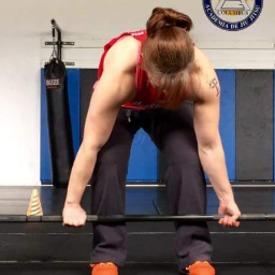How much protein should I be eating to lose weight?

rachel_hml
Posts: 12 Member
If i eat as much as my daily goal, is that enough?
I weigh 138 lbs, 5'5 and im 17 years old. I do cardio 3x a week and strength training 3x a week. I currently eat around 1500 - 1600 calories. I read that to get thinner I need to do strength training ( which is do) and eat lots of protein. How much should I be eating, in grams. Under my daily goals it says 65 grams, is that enough? 65 grams is my goal once I've added my exercise.
I weigh 138 lbs, 5'5 and im 17 years old. I do cardio 3x a week and strength training 3x a week. I currently eat around 1500 - 1600 calories. I read that to get thinner I need to do strength training ( which is do) and eat lots of protein. How much should I be eating, in grams. Under my daily goals it says 65 grams, is that enough? 65 grams is my goal once I've added my exercise.
0
Replies
-
http://www.myfitnesspal.com/topics/show/1037494-tdee-macros-deficits-oh-my?hl=macros#posts-15918235
1g per lb of body weight seems like a normal amount. You may need more if you're lifting.0 -
My maintenance calories are around 1700, I probably cut around 1500/1600. I aim to eat at least 100 grams of protein/day. I am adjusting my macros currently to gain a little more lean muscle, so I am increasing my protein to about 140 grams/day. I am 5'8'' 132 lbs. If you're strength training, you really should aim for at least 100 grams of protein/day.0
-
Too many people push the protein issue. I say you don`t need any more than 100g MAX of high quality protein.0
-
Too many people push the protein issue. I say you don`t need any more than 100g MAX of high quality protein.0
-
U don't need "protein" to lose weight, you need a calorie deficit. You do need protein to feed your lean mass.. I'm 145 and I do 100-110 protein a day. At 230 I still did 100-110 a day. Feeding lean mass.0
-
http://www.myfitnesspal.com/topics/show/1037494-tdee-macros-deficits-oh-my?hl=macros#posts-15918235
1g per lb of body weight seems like a normal amount. You may need more if you're lifting.
Based on the advice of my nutritionist and other articles I've read (sorry - didn't save them so can't cite them), this is actually intended to be 1g per lb of lean body mass, not overall body weight.
If your goal is weight loss, just worry about keeping your calories in lower than your calories out. That being said, protein can leave you feeling more full than carbohydrates, is necessary for building muscle, etc.
You may want to try this calorie calculator, which also provide macros (and advice on such things): http://scoobysworkshop.com/calorie-calculator/
A lot of people seem to recommend it, though I'm not proclaiming myself an expert.0 -
You should lift heavy, first of all. Then you should eat, minimally, your body weight in grams of protein. So you said 135lbs (I think) that would be 135g of protein a day.0
-
1g protein per lb of LEAN body mass. I am 128 lbs my LEAN body mass is 97 lbs. so my goal is 97g of protein a day. Sometimes on lifting days I will eat 10 to 15g extra0
-
not sure where the 1g per lb comes from but the general rule is to multiply your body weight in lbs by .37 or .8 in kgs to get the min daily amount required. i tried high protein and low carb approach but didnt quite work for me as i felt hungry between meals and was craving for carbs. Protein is not a very good source of fuel unlike carbs or fat either. I changed to high fat, low carb moderate protein macros and noticed a big difference. i can eat breakfast and then not feel hungry for half a day. Also Im not craving for carbs like i did before. my current CPF ratios are 20/25/55. When training I increase P and lower fat and carbs.0
-
I find this also a concern of mine. I try to each more protein to avoid the hunger that comes along with eating carbs, and those highs andlows, but how much is enough? Can protein make you fat? I spend so much time trying to figure out what is right that in the process, I feel like I gain weight. Grrr:noway:0
-
The main role of proteins is to maintain tissue and ensure that various organs in our body are functioning properly and they're not the main source of energy unlike carbs and fats therefore to lower carbs one should increase fats intake, not proteins. Obviously the minimum amount would be higher when training to repair broken muscles tissue.0
This discussion has been closed.
Categories
- All Categories
- 1.4M Health, Wellness and Goals
- 398.2K Introduce Yourself
- 44.7K Getting Started
- 261K Health and Weight Loss
- 176.4K Food and Nutrition
- 47.7K Recipes
- 233K Fitness and Exercise
- 462 Sleep, Mindfulness and Overall Wellness
- 6.5K Goal: Maintaining Weight
- 8.7K Goal: Gaining Weight and Body Building
- 153.5K Motivation and Support
- 8.4K Challenges
- 1.4K Debate Club
- 96.5K Chit-Chat
- 2.6K Fun and Games
- 4.8K MyFitnessPal Information
- 12 News and Announcements
- 21 MyFitnessPal Academy
- 1.6K Feature Suggestions and Ideas
- 3.2K MyFitnessPal Tech Support Questions






